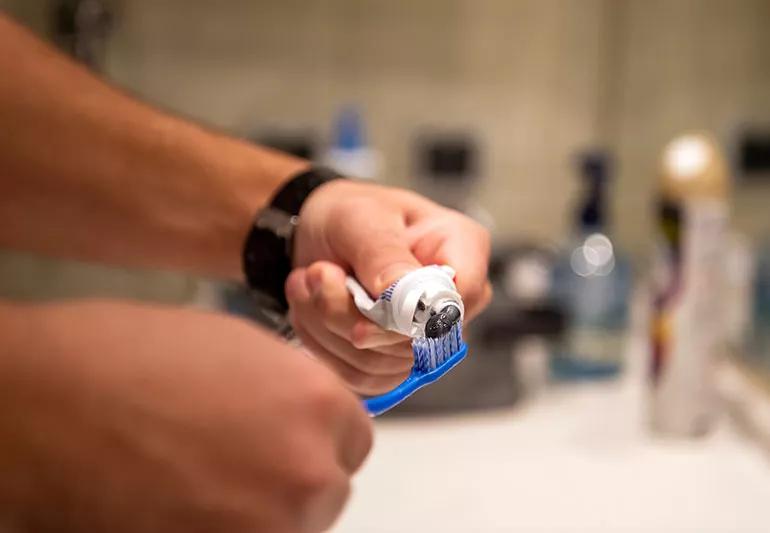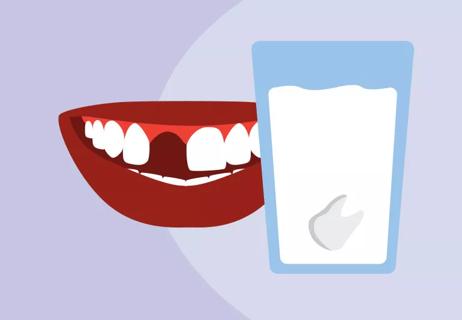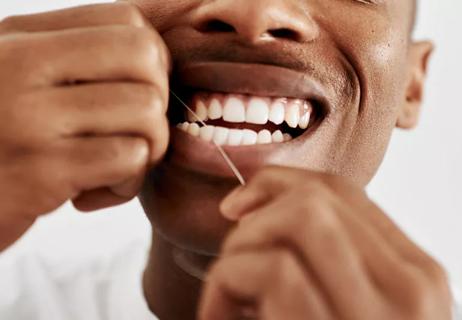How your teeth and gums can alert dentists to other health problems

Going to your dentist twice a year is important to make sure your teeth are in tip-top shape. But you might not realize that a dental check-up can also be an opportunity for a mental health tune-up.
Advertisement
Cleveland Clinic is a non-profit academic medical center. Advertising on our site helps support our mission. We do not endorse non-Cleveland Clinic products or services. Policy
“People are often surprised that their dental health is connected with their oral health, and their oral health, in turn, is connected with their mental health,” says psychologist Susan Albers, PsyD. “But they’re really interconnected.”
Yes, your dental health can affect your mental health. “When your oral health is suffering, it can decrease the quality of your life or exacerbate mental health issues,” explains Dr. Albers. “If you feel embarrassed about the health of your teeth, you may notice that this triggers some social anxiety. You may withdraw. Or it may hurt your self-esteem. This can lead to an increase in some of your mental health symptoms.”
Dr. Albers says the opposite is also true — your mental health can affect your dental health, such as the health of your teeth and your gums. When you’re under stress, you might ignore your dental hygiene. In fact, Dr. Albers adds that the health of your teeth can reveal many things about your overall health. “It gives a clue about your stress level, your anxiety, your mood and the presence of chronic eating problems.”
In a 2015 meta-analysis of 25 studies spanning 25 years, researchers found that people living with severe mental health disorders were 2.8 times more likely to have lost their teeth than people in the general population. This gap is because of untreated health conditions or difficulty accessing dental care, Dr. Albers adds.
Advertisement
All of this can also affect your physical health. For example, some people engage in what Dr. Albers calls “self-soothing behaviors” — like drinking, smoking or eating a lot of highly processed foods, all of which have documented negative health impacts.
If you feel depressed or anxious, it can often feel impossible to take care of yourself and do even small daily tasks. That includes taking care of your dental health. “You may not have the motivation or the energy to attend to dental hygiene,” says Dr. Albers. “You might also have an increase in the perception of pain and avoid the dentist.”
Accordingly, your mouth and teeth offer many clues to potential mental health issues. “If you have anxiety, you may notice that you grind your teeth at night or experience jaw pain,” says Dr. Albers. “Worn enamel may also be a very big red flag that you are experiencing high levels of anxiety or stress.”
People living with obsessive-compulsive disorder or bipolar disorder might also have worn enamel. “You might brush your teeth several times a day,” Dr. Albers notes. “It becomes more of a ritual than a cleaning procedure.”
Worn enamel can also be a side effect of an eating disorder. “People struggling with eating disorders often have high levels of tooth decay or difficulty with their gums,” Dr. Albers says. This is due to malnutrition or from eating an abundance of sugary or highly processed foods.
Because mental health and dental health are interconnected, things you do to manage one also benefit the other. Luckily, you can make small changes to your day-to-day life that can have a lasting impact.
Consuming nutritious food — in other words, a diet high in fruits, veggies and other vitamin-packed items — is always a good idea. “What you eat impacts greatly both your mood and your oral health,” says Dr. Albers. “Be sure to eat a large variety of nutritious foods as well. This is going to boost your mood and protect your teeth and gums.”
There are many signs and symptoms that something is up with your dental hygiene. Your gums might bleed while brushing your teeth or flossing. Other times, your jaw might ache. Or maybe you experience sensitivity to hot or cold temperatures.
Dry mouth can also be a side effect of certain antidepressants, anti-anxiety medications and mood stabilizers. “This is a condition that reduces the saliva in your mouth,” says Dr. Albers. “Saliva is really important for your oral health.” Not only does it help you digest food, but saliva also helps kills harmful germs that can lead to tooth and gum problems.
If you suspect you might have dry mouth and are taking medication, Dr. Albers suggests that checking in with your dentist, doctor and therapist might be a good idea to make sure it’s not hurting your teeth.
Advertisement
If you notice that you have worn enamel, this can indicate high levels of anxiety and stress. In that case, you might want to practice some stress and anxiety reduction activities.
These might include downloading an app to help you sleep better and be calm at night, or deep breathing and meditation exercises. In fact, you can practice deep breathing and meditation throughout the day to de-stress and focus.
Dentists aren’t just there to polish up your pearly whites. They can also detect when other things are going on in your life. “Dentists are sometimes the first professional to identify and diagnose a mental health issue,” says Dr. Albers. “They make a lot of referrals to counselors and therapists.”
In fact, she says she frequently sees people who are living with eating disorders after a dentist referral. A dentist that notices teeth grinding may also prescribe someone a mouthguard and ask about potential anxiety.
Of course, getting to the dentist can sometimes be challenging due to nerves, fear or anxiety. While Dr. Albers assures that it’s normal to feel a little bit anxious before a dental appointment, some people avoid the dentist at all costs. “They have what is known as a dental phobia,” she says. “If this sounds like you, it’s really important to contact a therapist who can help you and find treatment so that you can take care of your mental health and your dental health.”
Advertisement
To ease your anxiety before visiting your dentist, you may want to make a list of questions or concerns in advance so you can share them at your appointment. That might include any physical issues you’re having with your teeth, mouth or gums. Or if something doesn’t feel quite right, it might be worth mentioning.
“It’s common to have a lot of anticipation, anxiety and fear before the dentist,” reiterates Dr. Albers. “Doing some positive self-talk and mantras to help us relax and calm can ease the situation.”
Above all, don’t be embarrassed if you’re having issues with your teeth, gums or mouth. “If you are struggling with your oral hygiene, check in with yourself,” says Dr. Albers. “Ask if there is a mental health issue that may be standing in the way.”
If you suspect that might be the case, mention this to your therapist, or work with your doctor to find a therapist to talk to. “Dentists are very willing to help,” says Dr. Albers. “They’ve seen signs and symptoms of conditions before. And a dentist and therapist working together can help you to work on your mental health issues, and protect your oral health and overall health.”
Advertisement

Sign up for our Health Essentials emails for expert guidance on nutrition, fitness, sleep, skin care and more.
Learn more about our editorial process.
Advertisement

Daily oral hygiene goes a long way to keeping your mouth healthy and your smile bright

Start weaning your toddler off daytime pacifier use by 12 months old to help prevent dental issues and speech delays

At-home products like whitening toothpaste, rinses and strips can bring bright results

Keep the nail file out of your mouth and leave any tooth shaving up to your dentist

Help and encourage them to brush and floss regularly, limit sugary foods and get routine dental checkups

Act quickly to increase the chances that your tooth can be saved

You can do damage to fillings, crowns and even your teeth themselves

No, oil pulling and vitamin D won’t fill or fix a cavity

Even small moments of time outdoors can help reduce stress, boost mood and restore a sense of calm

A correct prescription helps your eyes see clearly — but as natural changes occur, you may need stronger or different eyeglasses

Both are medical emergencies, but they are very distinct events with different causes